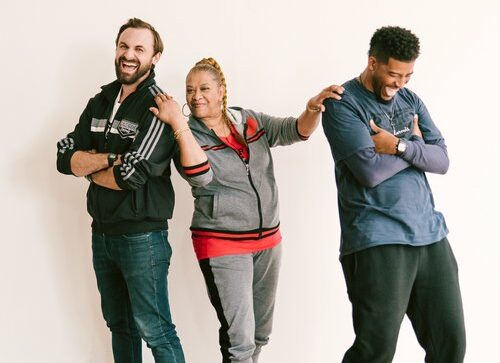
- Kim Kisner
- Business
- 08/18/2022
A Business Built to Accelerate the Global Shift Towards a Restorative, Equitable, and Just Economy

SBN Detroit spoke with Jarret Alan Schlaff, Pingree Detroit & Pingree Mfg L3C co-founder and CEO.
Since 2007, Schlaff has launched four separate nonprofit projects and organizations currently making an impact in the youth mentorship, environmental justice, and food access arenas across Metro Detroit. He has 10 years of experience in management and personal, professional, and organizational development.
Schlaff was named a Global Leadership Fellow by the Hesselbein Leadership Institute in 2010, Campus 2 Congress Fellow with the Bard Center for Environmental Policy in 2012, was one of 90 leaders selected from across the U.S. as a 2015 Young American Leadership Fellow with Harvard Business School, named an Emerging Leader by the Detroit Regional Chamber in 2015, was a finalist at the 2016 Detroit Regional Chamber Entrepreneurship Pitch Detroit competition, and was named a WXYZ-TV 20/20 Detroit Person of the week in November 2017.
Pingree Detroit was awarded the Social Impact award for Sustainability and Standards by Gingras Global in 2018 and 2019. Schlaff shares with us here Pingree’s sustainability mission and practices.
Q: What is Pingree Detroit?
A: Pingree Detroit, founded in 2015, is a worker-owned (there are nine of us), triple bottom line design and manufacturing cooperative that hand-makes footwear and home, pet, and fashion accessories in Detroit with leather, seat belts, airbags, and other materials upcycled from the auto industry.
Our purpose is to bring forth solutions for footwear, accessories, and goods that maximize the well-being of our customers, team, community, and our environment. To accelerate the global shift towards a restorative, equitable, just economy, we move every day to create resilient products that are not derived from fossil fuels or that are carbon negative.
All our processes are non-toxic. We upcycle leather and other materials otherwise destined for the landfill. The majority of our equipment and materials are sourced from the USA. All shipping materials we use are 100% recycled and compostable.

Q: Please share what work is being done at Pingree toward sustainability.
A: We are looking to reimagine what the future looks like in terms of maximizing the well-being really of all living things and to us, that includes seven generations from now.
We pay a living wage to our makers, use quality materials otherwise destined for the landfill, and are working hard to eliminate all harmful chemicals and climate change-causing emissions from the entire life-cycle of our production and distribution processes. “
We look at the entire ecosystem input through output and beyond, asking ourselves, where does this material come from, what does it take to make this piece of steel that’s going into one of our bags, etc.
By 2025 we are committed to Designing products so that we can source the majority of materials from the Great Lakes Region, have zero carbon emissions, and offer military-grade, fossil-free plant-based alternatives to leather and plastic. In short form, we’ve set the following goals to reach by 2025:
-
Waste-free
-
Toxic free
-
Carbon negative
-
Offer products made from plant-based alternatives to leather and plastic
-
Source majority of materials from the Great Lakes Region
Q: How will you reach these goals?
A: Looking at the breakdown of these commitments we know it’s ambitious for our small team of nine. Conversely, being a small team allows us to be nimble. We can test out small runs of plant-based materials for our pet collars, etc.
Sourcing materials from mainly the great lakes region is really difficult. For example, there are only a few companies that make zippers and Velcro. But we also see that as an opportunity to support Midwest businesses. We also urge our suppliers to push the curve for standards of measuring and offsetting.
We’ve partnered with the auto industry to use reclaimed and underutilized materials from their production process.
Now, with 3-D printing and 3-D knitting, we are hoping to be able to bring production and supply channels closer to home.
When it comes to our carbon-neutral goals, we work to offset the footprint with renewable energy at our workshops. We participate in tree planting and reforesting efforts. Every product bought is offset in production and shipping.
Q: What drives your passion?
A: Humanity’s current addiction to growth-at-all-costs economic system is threatening our collective home and leaves too many people behind. We are called to do something about it.
I truly believe that anything is possible, and I’m committed to being a part of bringing forth ideas whose time has come.
I’m motivated and driven by the idea of a future that works for all.
Q: What are your biggest challenges?
A: Trying to equally balance profit with maximizing well-being and our multiple layers of commitment.
We are small and we are self-funded so finances are always an issue. We literally started with $15,000 of my own money seven years ago. Sustainable materials can cost up to seven times the amount of materials made from plastics.
Q: From your perspective, what is the role of businesses in Detroit in terms of sustainability overall for the city?
A: There is amazing work happening where folks are prioritizing sustainable alternatives.
I think businesses have a role to lead by example and offer alternatives for people to participate in.
I think recognizing the people behind the products is important. Understanding how it’s made, why it’s made, and where it’s made gives people more of a context for the things they purchase.
We also share the name of the maker of every product. From our $9.99 pet leash to our $21 coasters to our $330 leather sneakers that took 2.5 days for a person to single-handedly put together … connecting with the maker changes the way people think and use our products.
Q: What businesses and partners can you point to that are doing it well?
A: Detroit Denim, Rebel Nell, ISAIC (Industrial Sewing and Innovation Center), and Carhartt. Also, one example of a partner we are working with is AutoLiv seatbelts – they are diverting waste and offering sustainable alternatives.
Kim Kisner
- All
- Business
- Community
- Education
- Events

The Chip Bag Project, based in Detroit, is a sustainability initiative that upcycles hard-to-recycle snack packaging — particularly chip bags — into insulated sleeping bags for individuals experiencing homelessness. Founded by Eradajere Oleita, the project addresses both environmental waste and housing insecurity by transforming materials like Mylar into practical, thermally efficient solutions. In June, Oleita was among Trelllis’s 30 Under 30, its annual recognition of the brightest young...

PowerPanel, headquartered in Oxford, focuses on sustainable energy technology with a particular emphasis on hot water systems and thermal energy capture. The company designs and manufactures modular solar hybrid systems that integrate both photovoltaic and thermal components into a single unit. Its goal is to offer energy solutions that are more efficient, durable, and economically viable for a range of commercial and industrial applications. SBN Detroit interviewed Garth...

The Detroit VA Healthcare System is implementing a systemwide sustainability strategy through its Green Environmental Management System (GEMS), designed to reduce waste, lower energy consumption, and improve operational efficiency. The program recently earned Practice Greenhealth’s “Top 25 Environmental Excellence Award.” Through coordinated efforts across departments and a commitment to innovation—particularly in high-resource areas like dialysis—the Detroit VA works to demonstrate how environmental stewardship and clinical care can go...







